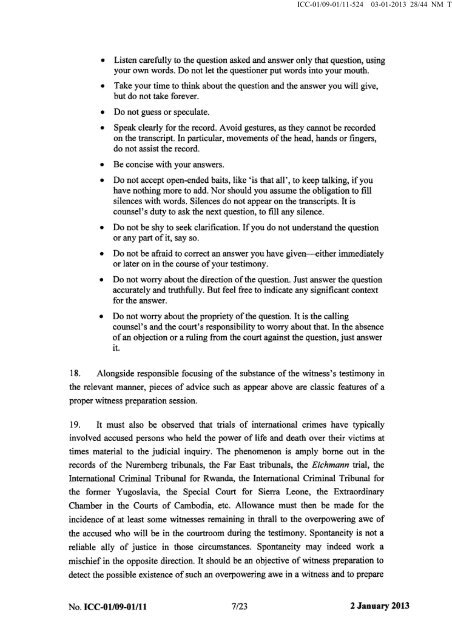13fpZ7l
13fpZ7l
13fpZ7l
You also want an ePaper? Increase the reach of your titles
YUMPU automatically turns print PDFs into web optimized ePapers that Google loves.
• Listen carefully to the question asked and answer only that question, using<br />
your own words. Do not let the questioner put words into your mouth.<br />
• Take your time to think about the question and the answer you will give,<br />
but do not take forever.<br />
• Do not guess or speculate.<br />
• Speak clearly for the record. Avoid gestures, as they cannot be recorded<br />
on the transcript. In particular, movements of the head, hands or fingers,<br />
do not assist the record.<br />
• Be concise wdth your answers.<br />
• Do not accept open-ended baits, like 'is that all', to keep talking, if you<br />
have nothing more to add. Nor should you assume the obligation to fill<br />
silences with words. Silences do not appear on the transcripts. It is<br />
counsel's duty to ask the next question, to fill any silence.<br />
• Do not be shy to seek clarification. If you do not understand the question<br />
or any part of it, say so.<br />
• Do not be afraid to correct an answer you have given—either immediately<br />
or later on in the course of your testimony.<br />
• Do not worry about the direction of the question. Just answer the question<br />
accurately and tmthfully. But feel free to indicate any significant context<br />
for the answer.<br />
• Do not worry about the propriety of the question. It is the calling<br />
counsel's and the court's responsibility to worry about that. In the absence<br />
of an objection or a mling from the court against the question, just answer<br />
it.<br />
18. Alongside responsible focusing of the substance of the witness's testimony in<br />
the relevant maimer, pieces of advice such as appear above are classic features of a<br />
proper witness preparation session.<br />
ICC-01/09-01/11-524 03-01-2013 28/44 NM T<br />
19. It must also be observed that trials of intemational crimes have typically<br />
involved accused persons who held the power of life and death over their victims at<br />
times material to the judicial inquiry. The phenomenon is amply bome out in the<br />
records of the Nuremberg tribunals, the Far East tribunals, the Eichmann trial, the<br />
Intemational Criminal Tribunal for Rwanda, the Intemational Criminal Tribunal for<br />
the former Yugoslavia, the Special Court for Sierra Leone, the Extraordinary<br />
Chamber in the Courts of Cambodia, etc. Allowance must then be made for the<br />
incidence of at least some witnesses remaining in thrall to the overpowering awe of<br />
the accused who will be in the courtroom during the testimony. Spontaneity is not a<br />
reliable ally of justice in those circumstances. Spontaneity may indeed work a<br />
mischief in the opposite direction. It should be an objective of witness preparation to<br />
detect the possible existence of such an overpowering awe in a witness and to prepare<br />
No. ICC-01/09-01/11 7/23 2 January 2013


